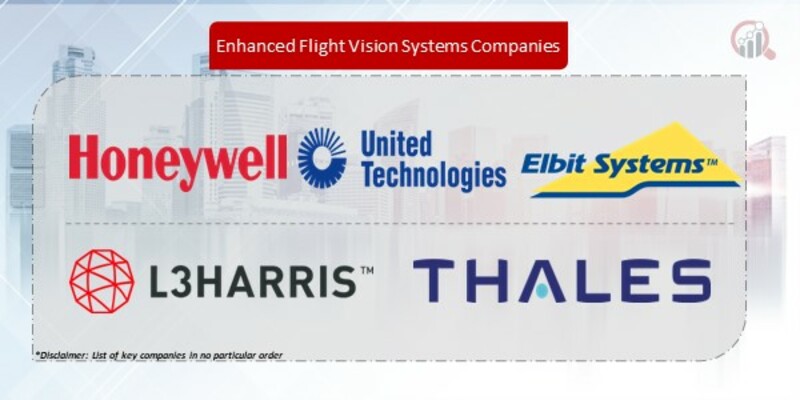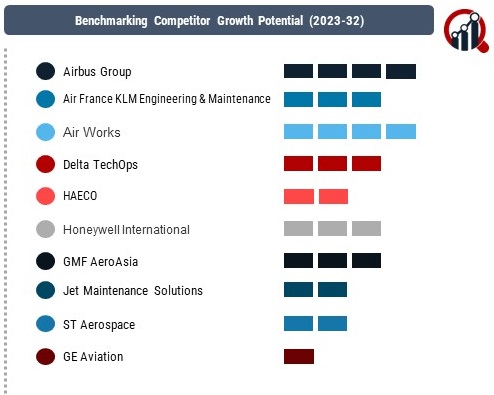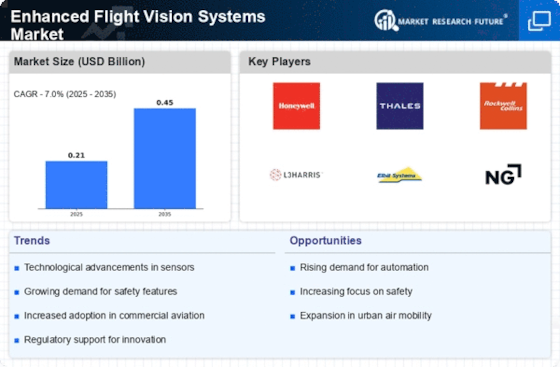Top Industry Leaders in the Enhanced Flight Vision Systems Market

Strategies Adopted Key Players Enhanced Flight Vision Systems Market Dynamics
Honeywell International, Inc. (U.S.)
United Technologies Corporation (U.S.)
L-3 Communications Holdings, Inc. (U.S.)
Thales Group (France)
Elbit Systems Ltd. (Israel)
In a bid to capture a larger market share, companies in the EFVS space are strategically diversifying their product portfolios. Some are focusing on the integration of artificial intelligence and machine learning algorithms to enhance image processing capabilities. Others are leveraging partnerships with aviation authorities and regulatory bodies to streamline the certification process for EFVS-equipped aircraft. Furthermore, companies are investing in marketing initiatives to create awareness among aviation stakeholders about the benefits of EFVS, emphasizing its contribution to safety, reduced operational costs, and improved overall flight experience.
Factors for Market Share Analysis:
Several factors contribute to the analysis of market share within the EFVS industry. Technological advancements and the ability to offer a comprehensive suite of EFVS solutions that cater to different aircraft types play a pivotal role. Market players with a global presence and strong distribution networks are better positioned to address the diverse needs of the aviation sector. Additionally, customer satisfaction and the ability to comply with stringent aviation regulations are critical factors influencing market share. Companies that can provide reliable, cost-effective, and regulatory-compliant EFVS solutions are likely to gain a competitive advantage.
New and Emerging Companies:
The EFVS market is witnessing the entry of new and emerging companies eager to capitalize on the growing demand for enhanced flight vision technology. Start-ups such as Vision Systems International LLC and Astronics Corporation are making notable strides with their innovative EFVS solutions. These companies are often characterized by their agility, focusing on niche markets and specific aircraft segments. While they may face challenges in establishing a robust global presence, their nimbleness allows them to respond swiftly to market trends and emerging technologies, presenting a potential threat to established players.
Industry News:
The EFVS market is dynamic, with frequent developments and announcements shaping its landscape. Recent industry news includes advancements in sensor technologies, breakthroughs in augmented reality displays, and collaborations between EFVS manufacturers and aviation authorities to establish industry standards. Moreover, regulatory updates from organizations such as the Federal Aviation Administration (FAA) and the European Union Aviation Safety Agency (EASA) significantly impact market dynamics, influencing the direction of EFVS development and deployment.
Current Company Investment Trends:
Companies in the EFVS market are making substantial investments to stay ahead in the technological race. Research and development initiatives are a key focus, with significant funds allocated to enhance image processing algorithms, improve sensor technologies, and develop next-generation EFVS solutions. Investment trends also reflect a commitment to sustainability, with companies exploring eco-friendly materials and energy-efficient technologies. Moreover, strategic acquisitions and partnerships with emerging tech firms are common, allowing established players to integrate cutting-edge innovations into their existing product lines.
Overall Competitive Scenario:
The overall competitive scenario in the EFVS market is characterized by intense rivalry among key players, driven by a shared commitment to innovation and safety. Established companies with a strong track record in aviation technology continue to dominate, leveraging their experience and global presence. However, the entry of new players brings a fresh perspective and accelerates the pace of innovation, challenging industry norms and fostering healthy competition. The market is poised for further growth as technological advancements, regulatory support, and increased awareness drive the adoption of EFVS across the aviation sector. The future promises a landscape where companies, both traditional and emerging, will need to adapt swiftly to stay competitive and meet the evolving needs of the aviation industry.
Recent Company News :Top of Form
Leading the charge in the EFVS market are established players such as Honeywell International Inc., Elbit Systems Ltd., and L3Harris Technologies Inc. These companies have maintained their dominance through strategic partnerships, mergers, and acquisitions. Honeywell's collaboration with major aircraft manufacturers and its focus on developing advanced EFVS technologies have solidified its market position. Elbit Systems, on the other hand, has excelled in customization, providing tailored solutions to meet the unique needs of various aircraft platforms. L3Harris Technologies stands out for its continuous investment in research and development, staying at the forefront of technological innovation.












